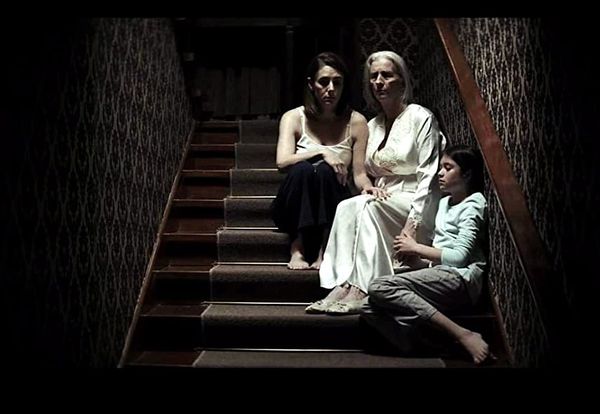The Academy of Motion Picture Arts and Sciences announced on Monday, March 15, the nominations for the 93rd Oscars. Best International Feature Film nominees are from Denmark, Thomas Vinterberg’s Another Round (starring Mads Mikkelsen, Thomas Bo Larsen, Magnus Millang in Druk, co-written with Tobias Lindholm); From Hong Kong, Derek Tsang’s Better Days (Dongyu Zhou, Jackson Yee, Fang Yin); From Romania, Alexander Nanau’s Collective (Razvan Lutac, Mirela Neag, Catalin Tolontan in Colectiv, co-written with Antoaneta Opris); from Tunisia, Kaouther Ben Hania’s The Man Who Sold His Skin (Yahya Mahayni, Dea Liane, Koen De Bouw in L'Homme Qui A Vendu Sa Peau), and from Bosnia and Herzegovina, Jasmila Žbanic’s Quo Vadis, Aida? (Jasna Djuricic, Izudin Bajrovic, Boris Ler).
 |
| Jayro Bustamante: “I can understand victims. And I can feel empathy with them.” |
The Oscar-shortlisted film from Chile, Maite Alberdi’s The Mole Agent (Sergio Chamy, Romulo Aitken in El Agente Topo) snared a Best Documentary nomination. From Norway, Maria Sødahl’s Hope (with Stellan Skarsgård and Andrea Bræin Hovig in Håp); from France, Filippo Meneghetti’s Two Of Us (Barbara Sukowa, Martine Chevallier, Léa Drucker in Deux), and Jayro Bustamante’s La Llorona (with Margarita Kenéfic, Sabrina De La Hoz, Ayla-Elea Hurtado, María Mercedes Coroy, María Telón, Julio Diaz) are three notable omissions from the Best International Feature Film nominees. Thomas Vinterberg also received a Best Director nomination and Another Round won the Best Foreign Film César Award.
In this part of my Zoom conversation with Jayro Bustamante from Guatemala City, we speak about feeling the suffering of others, looking for justice, dream logic, the women of La Llorona and Guatemala.
Anne-Katrin Titze: One of my favourite scenes is when the three generations of women are sitting on the stairs. It represents that it isn’t their house. They’re sitting in the staircase. It should be their house but they are like visitors, like spirits themselves who have to sit in the staircase and occupy the in-between spaces that the men leave for them. Is that where you were going with that?
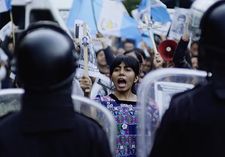 |
| Jayro Bustamante: “I don’t know if you can find groups of male people, male characters looking for justice, looking for disappeared relatives.” |
Jayro Bustamante: Yeah, for sure. In a way, you know, I was studying a bit and analysing the human histories after wars. And it’s very curious - I don’t know if you can find groups of male people, male characters looking for justice, looking for disappeared relatives. I never found that. I found some men doing that but normally it’s groups of women.
So I wanted to give women that honour to be in the centre of looking for justice in the film. And in a way, if you analyse each one of the characters, even if they are having different problems, each of the problems of the female characters came from a man. A man who has the sole nefastic power.
AKT: Can you explain this further?
JB: This bad power, this dark power he is using. Even if he doesn’t have the necessity to use the power. The power is working all the time, just because it’s him. So in a way, I wanted to represent with each woman La Llorona.
AKT: I think the grandmother [Carmen, played by Margarita Kenéfic] says at one point “the past is the past.” But watching your film, I believe people will rather think of the famous Faulkner quote “The past is never dead. It isn’t even past.” It’s present. You cannot get rid of genocide by putting on a tie and pretending it didn’t happen.
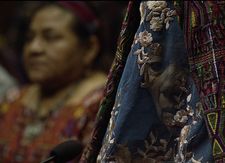 |
| Jayro Bustamante: “I decided to make the veil more like the Virgen de Guadalupe.” |
JB: Exactly and that’s why I really love the journey of Carmen in the film. Because Carmen starts out very very closed about progressive ways of thinking. And after that, after La Llorona came and La Llorona made her feel the suffering of others, Carmen changed completely in the film.
AKT: And she has these visions and dreams. The dream logic that you work in there so well, how you can be two people at once.
JB: Exactly!
AKT: She is living through this because she knows that it has to be worked through, which is very powerful. A question about the veils. The blue and golden veils the women wear who testify at the trial, is that a traditional garment or your invention?
JB: We invented that! You know in reality during the whole process that we lived in Guatemala looking for justice, indigenous women came to give their speech and share their lives with a tissue [over their heads]. It wasn’t a veil, it was a tissue to protect themselves. So I wanted to use that element but I wanted to show their faces and their emotions. So in a way, La Llorona and the Virgen de Guadalupe and La Malinche are very close. There’s a lot of elements linking these three characters. So I decided to make the veil more like the Virgen de Guadalupe.
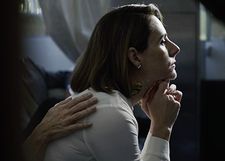 |
| Jayro Bustamante on Natalia (Sabrina De La Hoz): “I wanted to represent with each woman La Llorona.” |
AKT: The colour blue that is often connected to the Virgin Mary. It’s beautiful. I totally believed that this was a traditional veil because you put so many of the women in it. It works really well what you do with crowds and the individual. The perspective is so interesting. When they are in the house, we are with the family inside the house. We are trapped the way they are trapped and we are not with the protesters outside. In a way, you make us almost guilty by being with Don Enrique for so long.
JB: You know, in a way it was because I can understand victims. And I can feel empathy with them. And I can understand why a people that suffered continue living looking for justice. But I cannot understand people who made those acts, acts like a genocide. I cannot understand people who deny the suffering of others. So I wanted to be there to understand that.
And I wanted to be there to understand that during the night when guilt comes and somebody is haunting them. If they are really “heroes” as they are saying. Our dictators were saying they are saving us from communists and they are saying that all the people who were killed deserved to be killed. Even the babies, because they were communist.
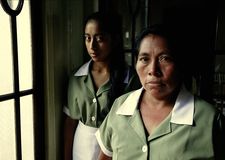 |
| Jayro Bustamante on Alma (María Mercedes Coroy) with Valeriana (María Telón): “Even if they are having different problems, each of the problems of the female characters came from a man.” |
AKT: Communist babies! The song at the end is a fantastic way to leave us with a haunting. This is a traditional song, I suppose?
JB: Yeah, it’s a very famous song but I changed the lyrics. Because this song continues talking about La Llorona as a woman who was left by a white man. So I decided to change the lyrics. I worked with a very famous Guatemalan singer, Gaby Moreno. Together with my team and her we changed the lyrics to put the lyrics closer to the story of the film.
AKT: The way you come into the story and the way you go out works so well.
Read what Jayro Bustamante had to say on growing up with La Llorona, using classic mythology, his Mayan princess, and the responsibility of representing Latin American people during the awards season.
The 93rd Academy Awards ceremony will be held on Sunday, April 25, 2021, at the Dolby Theatre at Hollywood & Highland Center in Hollywood, and will be televised live on the ABC Television Network. The Oscars also will be televised live in more than 225 countries and territories worldwide.








